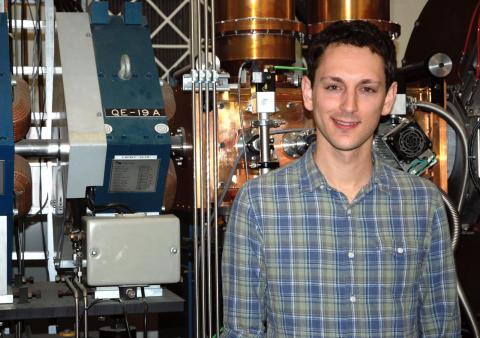
The Natural Sciences and Engineering Research Council (NSERC) has announced the winners of this year's Alexander Graham Bell Canada Graduate Scholarship. One of them comes from a TRIUMF member university and is a familiar face at the lab: accelerator physics Ph.D. candidate Doug Storey of the University of Victoria. Doug has worked closely with TRIUMF in both his graduate and doctoral research.
Doug's master's research has already proven highly beneficial to implementing safe operations procedures for the electron linear accelerator (e-linac) as part of the Advanced Rare IsotopE Lab (ARIEL) that is currently under construction at TRIUMF. Under supervision from Professor Dean Karlen, Doug developed and constructed sophisticated simulations of beam profile monitors for the e-linac that will provide critical diagnostic information about the electron beam along the full length of the beamline. The monitors were tested and verified last year, with 16 of them to be deployed along the e-linac as it is installed in the Electron Hall at TRIUMF later this year.
Having completed his master's coursework with a perfect 9.0 GPA, Doug began his doctoral research under co-supervision from Dr. Karlen and Dr. Lia Merminga, Head of TRIUMF's Accelerator Division. Doug will be the first graduate from the University of Victoria's new Accelerator Physics program, and has received praise from his colleagues and supervisors for his high quality research and ability.
"Doug has a strong mathematical background and a well developed physical intuition. His background in both engineering and physics allows him to assess the technical feasibility of new ideas and concepts and work towards their realization. His master's thesis was an excellent example of his integrated approach to solving physics problems," said Dr. Merminga.
For his doctoral research, Doug is developing a superconducting radio-frequency separator cavity for the e-linac that will become a crucial element in a future upgrade of the e-linac to include an Energy Recovery Linac and later a Free Electron Laser (FEL)– which could be the first in Canada and a unique facility within North America.
Research such as Doug's will help Canadian and international scientists produce and study isotopes to advance our understanding of the nucleus, the origins of the chemical elements, and potential medical applications. Furthermore, the e-linac projects are driving new applications of accelerator technology for environmental remediation projects such as PAVAC Industries' pollutant scrubbing technology.
Valued at $35,000 a year for up to three years, the NSERC Canada Graduate Scholarship recognizes high-caliber students in both Masters and Doctoral programs across Canada in the natural sciences or engineering that display academic excellence, research potential and communication, interpersonal ability or leadership prowess.
Congratulations, Doug!
--Ariane Madden, TRIUMF Communications Assistant
